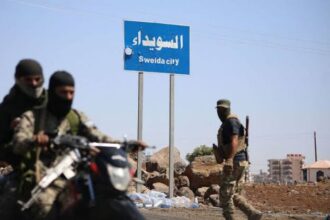The political arena waited too long for the convening of the new House of Representatives. Prior to the first session, the political scene was characterised as in a state of ambiguity, with much speculation over the head of parliament, deputy speakers, and figures who would have the most control. In addition, the lead-up saw disintegration within “Egypt’s Support” coalition, which was expected to win majority and the leading positions.
There are many who feel that there is a hidden power controlling the scene, and that the coalition – including its members – is just a tool in the hands of this power. This hidden power summoned dozens of Mubarak-era figures from the dissolved National Democratic Party (NDP) leaderships to chart the future, but the regime deals with them from afar, as their obvious presence would completely compromise the political arena.
The return of the NDP has manifested itself in a number of ways: the call of a former minister who was toppled with the Mubarak regime to run a national project; the return of a specialised minister to take up a role in the Ethiopian Renaissance Dam; summoning a former Mubarak adviser to give lectures for new parliament members.
Former members of the Mubarak era have established a permanent perch in local media. Were it not for the official recognition of the revolution, all the well-known faces would have reappeared.
State governance requires experts and senior advisors to work on formulating policies and plans, and follow up on local events. Therefore, the reappearance of such figures who lack requisite expertise does not reflect the need for experienced governance.
Although the presidency has formed specialised councils working alongside the president, citizens have begun to feel that they are obsolete; the members of these councils are specialists with an advisory opinion; however, there is a terrible absence of specialised economic expertise. The figures that have been hired in advisory capacities work in areas that are unknown. Therefore, the political vision has been rendered vague.
Meanwhile, the media nominated dozens of names for leadership positions, and imposed them on the presidency, such as counsellor Serry Siam, Sherif Ismail, Khalid Hanafi, Rania Elwany, Bahaa Abu Shakah, and others. The presidency singled out the names claiming that his search was based on a careful methodological investigation, and it was normal to emphasise that the appointed representatives came from among 1,600 names inspected carefully by state institution. Still, most of them are unknown names for even the well-versed observer, and their supposed credentials were absent.
Moreover, it is important to highlight that a parliament should have structural diversity, which, in Egypt, includes a healthy proportion of Copts, youth, people with special needs, and new political practitioners. It is not meant to be about names or personal wars between MPs; a parliament cannot be run by this primal mode.
The Free Egyptians Party is the only side that develops policies and visions in silence, and has aspirations to play a vital role in the parliament, rising above the accusations of seeking to control the whole parliament or being a party of businessmen.
The Future of a Nation Party can play a significant role in Egyptian politics, as it enjoys the support of businessmen, but it is likely to be less influential, due to the presence of dozens of former NDP members, who joined the party in the last few days before elections.
Businessmen such as Ahmed Abu Hashima and Naguib Sawiris are engaged in financing the aforementioned parties, and have appeared recently in interviews, confirming their political presence, so it is not hidden any more. It is a message to the regime that the businessmen’s fear of appearing and influencing politics behind the scene has disappeared. The scene is completely different now.
Despite President Al-Sisi’s continuous political and economic assurances regarding protecting businessmen’s economic presence and activities, the seems increasingly false. The situation will remain the same because of the businessmen’s wishes to pass laws and regulations that benefit them, to maximise their returns and protect their wealth, despite the fact that many of them transferred their wealth outside of Egypt as they fear current developments.
Further, in all cases, the parliament will not address the constitutional articles concerning the presidency’s authorities, or issues that are not priorities – at least for the time being. However, all attention will be focused on economic legislation that will translate President Al-Sisi’s philosophy.
There will be no clashes between Al-Sisi and representatives. This was evident in the way the situation was contained when a certain “undesirable” MP expressed his wishes to run for parliamentary speaker. What occurred later with this member sends an obvious message to all members to stick to their designated roles, otherwise, they will face the consequences. The majority in parliament is directly subject to the political satisfaction that comes from institutions and personnel who will promptly intervene to restore things to normal.
Certainly, the president – and the president alone – will influence political life, and will be at the forefront of the political scene. The parliament and government will have less credibility than the president will; therefore, any attempt to transfer a message to the president – under any circumstances – will fail. The parliament has a lot of work to do and efforts to exert, so it will not engage in political arguments with the president. Every member will be cautious during the first days, and public opinion will not forgive a disappointing performance.
Tarek Fahmy is a political expert and the head of the Strategic Division at the National Center for Middle East Studies. He is a professor of Political Science and Economics at Cairo University and a board member of the Israeli Studies Department at Zagazig University.



